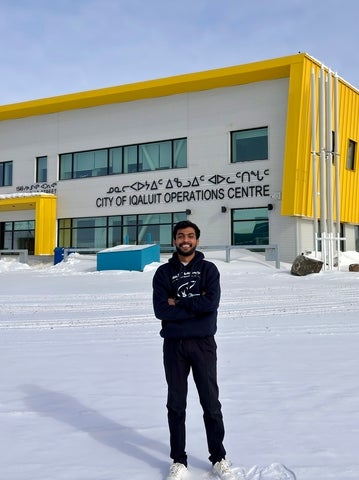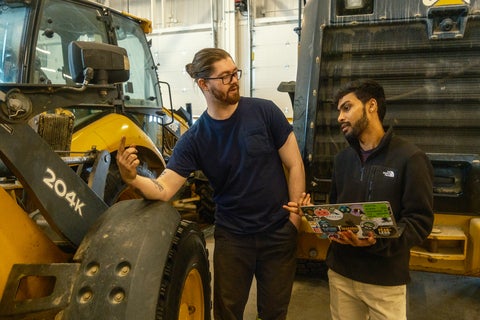From capstone to co-op: How Iqaluit is leveraging student talent to tackle northern challenges
By: Christie Zeb (she/her)
The City of Iqaluit collaborated with Waterloo co-op students to explore innovative approaches to its pressing infrastructure challenges, leading to transformative improvements in how the city operates.
The City of Iqaluit is no stranger to complexity. With a population of just over 7,400 and a harsh Arctic climate, the city faces a unique set of infrastructure and planning challenges.
To explore innovative responses to these challenges, the City partnered with the University of Waterloo’s Future Cities Institute (FCI). But what began as a capstone collaboration soon evolved into a deeper investment in student talent, one that is shaping real change in Nunavut’s capital.
FCI connects a global network of researchers, industry experts and students to create solutions for sustainable and resilient cities. Through its Interdisciplinary Capstone (i-Capstone) course, Waterloo students from across faculties teamed up to work on challenges facing the city, including asset management and trucked services water delivery logistics.
“We saw students bringing that academic foundation and professionalism, but more importantly, they were hungry to take on real-world challenges,” says Bill Williams, senior executive director of Municipal Infrastructure and Planning at the City of Iqaluit.
Inspired by the cutting-edge solutions and fresh thinking from the i-Capstone experience, the city took the next step and brought on co-op students for hands-on, term-long contributions.
We’re trying to innovate around technology, and these students bring that technical depth. They bring renewed energy paired with solid educational training.
In winter 2025, the city hired its first set of co-op students and has since seen student talent contribute meaningfully each work term. Students have led high-impact projects like fleet system rollouts, digital process upgrades and an augmented generation bylaw tool.
Innovation in the North, powered by student talent
Ahraz Yousuf (he/him) spent a co-op term with the City of Iqaluit as an engineering and public works digital solutions co-op student.

Ahraz Yousuf, Faculty of Engineering co-op student
During his work term, the second-year Software Engineering student was tasked with rolling out Fleetio, a fleet management software. He helped transform how the city tracked and maintained its vehicles, many of which are essential for daily operations in a remote and rugged environment.
“Earlier, all of this was being done using Excel and cross-department communication. But at the end of the day, that gets a little messy,” Yousuf says.
“The software helped to organize how they track their vehicle maintenance and inspections.”
Yousuf’s work began with understanding departmental workflows, collecting and organizing asset data and gradually onboarding teams across the city. He was especially mindful of maintaining operational continuity.
“I tried my best to implement it as close to their real-life workflows as possible because I didn’t want to put a break into that,” Yousuf says.
Beyond setup, Yousuf leveraged his software engineering skills to build custom tools using Fleetio’s application programming interface, including preparations for a public-facing web application providing real-time updates on trucked water/sewer services and snow clearing efforts. “A public-facing asset that tells the public where the water/sewer trucks and snow removal equipment are, promotes transparency and accountability,” Yousuf says.
The final stage of his work involved travelling to Iqaluit to lead in-person training for five departments, ensuring widespread adoption.
Yousuf’s experience with the city helped him expand his skill set beyond software engineering. Working across teams and seeing a project from start to finish, he developed collaboration, communication and project management skills.
I got to build something from the ground up. The role allowed me to step outside of traditional software development and into product implementation and stakeholder collaboration.
End-to-end support with real autonomy
To ensure students get the most from their remote roles, the City of Iqaluit assigns meaningful, outcome-driven work for which students can take full ownership. Rather than limiting them to junior-level tasks, the focus is on autonomy, impact and accountability from day one.
The city seamlessly integrates students into the team through regular communication touchpoints, access to key data and ongoing staff support. While the work is independent, they’re never working in isolation.

L-R: City of Iqaluit's service technician, Quinlin Iredale and Waterloo co-op student, Ahraz Yousuf
A standout feature of the City’s support model is the open access students have across the organization, including direct interaction with senior leadership. This level of exposure adds real value to the student experience.
“This isn’t just about filling a gap,” Williams says. “It’s about giving students meaningful ownership over projects that matter. And the outcome is innovation rooted in our lived realities.”
The ongoing partnership between the City of Iqaluit, FCI and Waterloo’s co-op program shows how interdisciplinary learning, research and work-integrated learning can come together to serve real community needs.
It’s also creating new opportunities for students to explore northern work terms that are both professionally enriching and socially impactful.
“It’s really interesting in that we're promoting more northern opportunities for students here at the University of Waterloo through co-op,” says Eryn Stewart (she/her), executive director at the Future Cities Institute.
“The students have found it extremely rewarding working in a northern Inuit community with distinct infrastructure needs, knowing that they're supporting those endeavours at a local level.”
Looking ahead, the city aims to involve Waterloo co-op students in focused innovation initiatives aligned with specific municipal priorities.